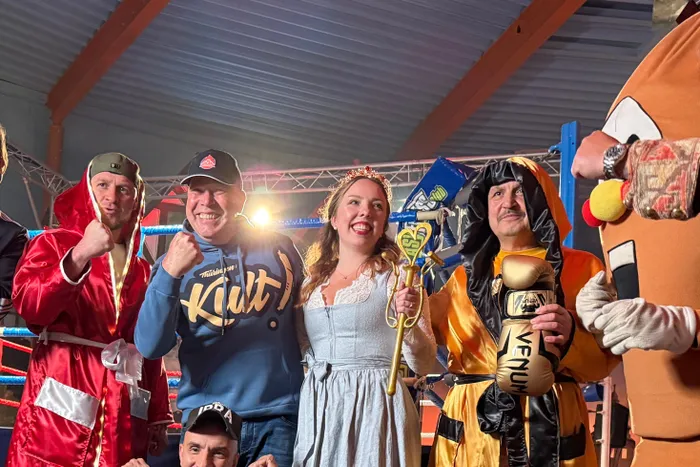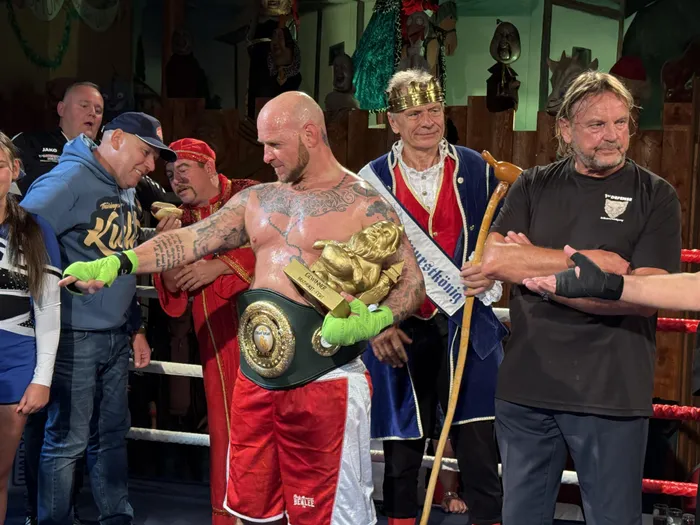A boxing match decides fight over birthplace of bratwurst

Participants before the fight in Mühlhausen. From left, Thuringian boxer Daniel Bertz, 1st German Bratwurst Museum Director Thomas Mäuer, restaurateur Sofia Hilleprandt, Nuremberger boxer Hasan Arli and mascot Wursti.
Image: Aaron Wiener/The Washington Post
Aaron Wiener
Call it the Thrilla in Thuringia.
Last Friday evening, two boxers stepped into the ring in the small Thuringian city of Mühlhausen to settle a centuries-old debate: Who can claim title to the world’s oldest bratwurst?
In one corner stood a fighter from the northern Bavarian city of Nuremberg, where bratwurst dates back at least 600 years. In the other, his opponent from Thuringia, which a newly discovered document suggests may have been making bratwurst 150 years earlier - in the 13th century.
The Nurembergers and Thuringians had long squabbled over who created bratwurst, based on historical documents, passed-down legend and more than slightly subjective regional pride. The fight would, at long last, settle the matter.
The seeds for the bout were sown when researchers from Erfurt, the Thuringian capital, stumbled upon a lease document from 1269 while investigating the history of the city’s Merchants’ Bridge. The document mentions a hut and a roasting pan at the bridge. According to the researchers, historians Martin Sladeczek and Karl Heinemeyer, it’s known that locals in that era ate sausages, so it appeared to be the earliest written evidence of residents roasting a form of bratwurst.
That didn’t sit well with Sofia Hilleprandt, whose restaurant in Nuremberg, Zum Gulden Stern, claims to be the world’s oldest bratwurst kitchen, documented as far back as 1419 on the same site where it operates today. (The wood used to build the restaurant, she said, was found to be cut even earlier, in 1380.)

Winning boxer Daniel Bertz wears his title belt and holds his trophy after claiming the title of world's oldest bratwurst for the German state of Thuringia.
Image: Aaron Wiener/The Washington Post
So Hilleprandt suggested resolving the dispute the way it might have been in the Middle Ages: with an old-fashioned fistfight.
Hilleprandt challenged Thomas Mäuer, director of the 1st German Bratwurst Museum in Mühlhausen, to a boxing match. Mäuer accepted. The two sides selected their proxies, and the fight was on.
About 300 to 400 ticket holders filed into a large hall of the bratwurst museum, built out to resemble a Thuringian village, with sausages dangling from a tree near the ring. A local drum corps kicked off the spectacle, followed by cheerleaders, a band playing the Thuringian anthem and a German heavy-metal performance about bratwurst.
Wursti, a sausage mascot, pranced around the perimeter.
The atmosphere was giddy and lighthearted, but to Hilleprandt and Mäuer, the stakes were high.
“Tonight is a big night in history,” Hilleprandt declared before the sparring began.
“Bratwurst isn’t just something to eat in Thuringia,” Mäuer said. “It’s also a way of life, a matter of the heart, a cultural asset.”
Five pairs of young boxers warmed up the crowd with preliminary bouts. Then it was time for the main event. The fighters representing Thuringia and Nuremberg climbed into the ring. The bell rang. The title to the original bratwurst hung in the balance.
But even as the main combatants set to make mincemeat of each other, it was clear the fight would not definitively settle the matter of bratwurst’s provenance.
Sizzling debate
To start, this not how history is typically written. But also: There are other claimants to the crown.
A restaurant in the Bavarian city of Regensburg, for example, also alleges to have the world’s oldest bratwurst, based on a document mentioning a cook there in 1378. (Hilleprandt counters that this restaurant is no longer in its original location, so hers is the oldest physical bratwurst kitchen.)
In Germany, it’s not uncommon for disputes over these sorts of titles to stretch back so far as to make claims virtually unverifiable. In the realm of beer, for instance, breweries like Munich’s Augustiner (dating to 1328) and Spaten (1397) are upstarts next to Weihenstephan, founded outside Munich in 1040 and widely considered the world’s oldest brewery.
And when it comes to bratwurst, the sides are brawling over substantially different products. Thuringian bratwursts, seasoned with garlic and caraway, can be nearly a foot long, substantially overhanging the rolls in which they’re eaten with mustard. Nuremberger bratwursts are much smaller, spiced with marjoram, and typically served at least three to a roll.
Still, there’s considerable regional pride at stake. The rowdy crowd of Nurembergers who traveled to Mühlhausen identified not as Bavarians but as Franconians, hailing from a south-central German region with a distinct dialect and a fierce devotion to their cultural heritage.
Mäuer, in turn, tied bratwurst to the rich history of Thuringia, in Germany’s geographic center. As part of the former communist East Germany - and now a stronghold of the far-right Alternative for Germany party - Thuringia is often overlooked as a cultural nexus, Mäuer said. He rattled off a list of luminaries born in the state or who spent their lives there: Bach, Goethe, Schiller, Nietzsche.
Mäuer quoted Martin Luther, who studied in Erfurt and reportedly praised the Thuringian capital, “where the bratwursts are long and the sermons are short.”
For Hilleprandt, the battle was more personal. Her father bought the restaurant building in 1980 after it had been vacant for 30 years, rescuing it from demolition and restoring it as a sausage restaurant. In 2020, he died, leaving Hilleprandt, then 19, to take charge of the business.
Hilleprandt said she was “astounded” when she learned of the Erfurt discovery. She wasn’t persuaded by the document and resolved to defend her family’s claim to the ur-bratwurst.
“I’m so proud of what my dad achieved,” Hilleprandt said. “My dad fought so hard to defend this title. What kind of a daughter would I be if I said, ‘Okay, you guys take the title’?”
Verbal jousting between the bratwurst battlegrounds reached a crescendo as the boxing match approached. The state premiers of Bavaria and Thuringia joked to the German press that they might have a bratwurst-eating contest.
Even as they roasted each other publicly, the sides privately conceded that each other’s bratwurst had a place on the German national menu. “The Nurembergers also make good sausages, and they also have a long tradition,” Mäuer said. “I would never say that to them.”
Mäuer conceded that the event was about serving up publicity as much as anything else.
“It’s good marketing,” he said before the fight, “but it’s also a lot of fun.”
Bite to the finish
In the end, though, it wasn’t really a fair fight.
The Thuringians enjoyed a significant home-court advantage, with not only a bigger crowd of supporters but also a lengthy hype-up routine before the match that included a reenactment of the writing of a 1404 document that Thuringians have long said proves their bratwurst supremacy.
(After completing the document, the actor picked up a bratwurst, only to find that it was the tiny Nürnberg type. “What is that?” he exclaimed in horror.)
The Nurembergers may claim an older bratwurst, but it didn’t help their cause to put an older boxer in the ring, 59-year-old Hassan Arli. And whatever the merits of Nuremberg’s smaller sausages, having a younger, heftier fighter, 40-year-old Daniel Bertz, gave the Thuringians a serious advantage.
Arli held on through three rounds, but in the fourth, hits from Bertz sent him to his knees. The referee called the match and raised Bertz’s fist in victory.
After awarding the title belt and a trophy shaped like a bratwurst-bearing gnome, Mäuer entered the ring and proclaimed, “We have the oldest, the most traditional and the best bratwurst!”
In the end, a spirit of conciliation prevailed and, in speeches in the ring, Mäuer and Hilleprandt reached a consensus of sorts: Thuringia could claim the oldest bratwurst recipe; Nürnberg could claim the oldest surviving bratwurst restaurant - with an anticipated boost in bratwurst tourism for all.
“I think,” Hilleprandt said, taking the microphone, “this will go in the bratwurst history books.”